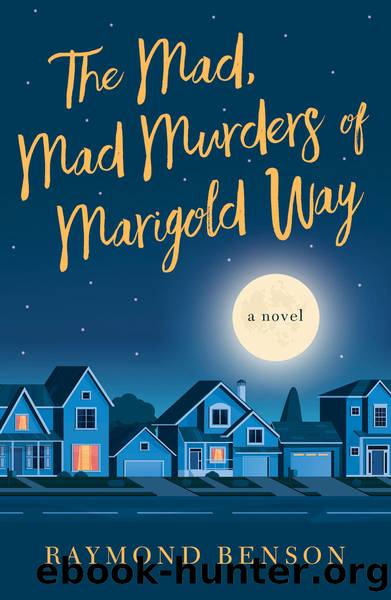The Mad, Mad Murders of Marigold Way by Raymond Benson

Author:Raymond Benson
Language: eng
Format: epub
Publisher: Beaufort Books
Published: 2022-12-15T00:00:00+00:00
22
The heart wants what it wants.
At least thatâs what poets and romanticists have led us to believe over the centuries. Theyâve given us the impression that love generates in the heart, right? But does it? What is it about the heart that is the Love Generator?
Iâll bet youâll say itâs because we feel it in our chests. Whenever we have those first pangs of a new relationship with someone, we feel all wobbly and fuzzy in the upper chest, that space between the lungs and behind the sternum. By the same token, if we have what they call a âheartbreak,â that is, a breakup or a fight with a loved one, we feel pain in the same spot. So, I suppose itâs natural that human beings over the years have likened the emotions related to romance to the heart.
What if I told you, though, that itâs really all in the mind?
When we are attracted to another person in, ahem, that way, the brain releases chemicals into our bloodstream called dopamine and oxytocin. These are drugs, folks, and we become addicted to them. The more intimate we become in a new relationship, the more wacko we get because of those drugs. Yes, dopamine and oxytocin produce physical effectsâyou know, heavy breathing, palpitations, flushing skin, and ⦠ahem, other physical reactions. Thereâs also a lot of adrenaline involved, and that affects the heart muscles too. So, yes, we do feel all these things in our chests, but itâs because the brain is the instigator.
Heartache works the same way. When those drugs are cut off, we experience withdrawal. Withdrawal is painful. We feel those unpleasant feelings in our chest because the heart is suddenly deprived of those feel-good drugs, dopamine and oxytocin.
That brings us to the term âcrime of passion.â You know what that is. Itâs when someone does something bad because of the withdrawal of those chemical reactions that begin in the brain and are felt in the heart. Crimes of passion occur all the time, donât they? Unfortunately, the term somehow whitewashes and romanticizes the reality of an act that is likely violent and messy.
But I guess âcrime of dopamine and oxytocinâ doesnât sound as elegant.
Download
This site does not store any files on its server. We only index and link to content provided by other sites. Please contact the content providers to delete copyright contents if any and email us, we'll remove relevant links or contents immediately.
Spell It Out by David Crystal(36110)
Professional Troublemaker by Luvvie Ajayi Jones(29651)
The Secret History by Donna Tartt(19058)
We're Going to Need More Wine by Gabrielle Union(19036)
Cat's cradle by Kurt Vonnegut(15339)
The Goal (Off-Campus #4) by Elle Kennedy(13658)
The Social Justice Warrior Handbook by Lisa De Pasquale(12187)
The Break by Marian Keyes(9358)
Crazy Rich Asians by Kevin Kwan(9280)
The remains of the day by Kazuo Ishiguro(8981)
Thirteen Reasons Why by Jay Asher(8894)
Educated by Tara Westover(8047)
The handmaid's tale by Margaret Atwood(7757)
Giovanni's Room by James Baldwin(7330)
Win Bigly by Scott Adams(7184)
This Is How You Lose Her by Junot Diaz(6877)
The Rosie Project by Graeme Simsion(6381)
Six Wakes by Mur Lafferty(6243)
The Power of Now: A Guide to Spiritual Enlightenment by Eckhart Tolle(5761)
